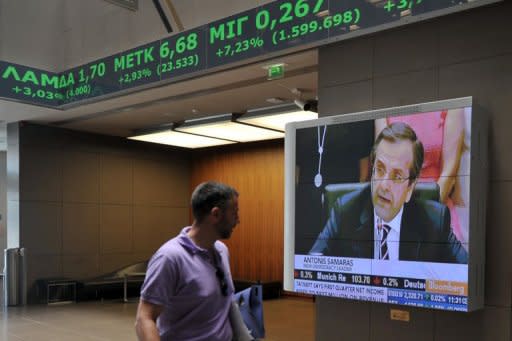Eurozone agrees to move quickly on Spain, Greece
Troubled eurozone nations agreed to act quickly to save Spain's banks, and to send international creditors to Greece for an update from the new government. The IMF meanwhile called on Thursday for the euro area to establish full banking union, and for the European Central Bank to adopt more demand-generating stimulus policies to help tackle the crisis. Adding to the sense of urgency, ratings agency Moody's downgraded the credit ratings of 15 of the world's largest financial institutions, citing exposure risk and Europe's economic woes. Spain's government will formally request eurozone financial assistance on Friday, said France's new Finance Minister Pierre Moscovici after Madrid indicated it could need up to 62 billion euros to save its distressed banks. Once Spain had lodged its request, officials from the European Commission, the European Central Bank and the International Monetary Fund would fly to Madrid for talks on restructuring the Spanish banking sector, he added. They would help the eurozone decide whether to forward the loan through the existing eurozone rescue fund, the European Financial Stability Facility (EFSF), or its soon-to-be successor, the European Stability Mechanism (ESM). The EU's Economic Affairs Commissioner Olli Rehn said he hoped to see Spanish bank aid preparations wrapped up by July 9. At the same time, the so-called "troika" of international creditors will return to Athens for the first time since March, IMF chief Christine Lagarde said at the close of talks with the 17 Eurogroup finance ministers. The new Greek government said Thursday it was hoping to re-negotiate parts of the original loan agreement. It said it wanted "to revise terms of the loan agreement without endangering the country's European course and its place in the euro." But eurozone leader Jean-Claude Juncker said the creditors would simply be looking to "update" accords struck against 130 billion euros of loans -- plus a 107-billion-euro write-down of privately held debt. Juncker, the Luxembourg premier who heads the Eurogroup, said a billion euros of blocked funds for Greece would be released "by the end of the month." Earlier Thursday, Spain announced that its crisis-torn banks needed up to 62 billion euros ($78 billion) to survive a severe financial slump -- considerably less than the maximum 100 billion euros originally foreseen in a June 9 eurozone rescue offer. Prime Minister Mariano Rajoy, speaking in Brazil, said European rescue funds were needed "as soon as possible". Spain's assessment of its needs was based on two independent banking audits: one by German firm Roland Berger, the other from US firm Oliver Wyman. The audits tested 14 top banking groups in a likely "baseline" scenario and a "stressed" outcome of a slumping economy and real estate sector. Madrid's single currency partners had offered a credit line of up to 100 billion euros for Spanish banks hammered by a 2008 property market crash -- although Finland said it wanted Spanish bank shares handed over as collateral. Thursday's meeting of eurozone finance ministers in Luxembourg will widen Friday to include Britain and other non-euro states. They will debate calls to introduce a tax on financial transactions. The meeting is part of the run-up to a two-day European Union summit, which opens next Thursday. In Rome on Friday, the leaders of the eurozone's big four -- Germany, France, Italy and Spain -- will hold their own preparatory talks. They are expected to elaborate a plan for the eurozone rescue funds to intervene more easily on bond markets. Italian Prime Minister Mario Monti warned in comments published Friday that failure to reach a deal at next week's EU summit would leave the bloc open to attack by speculators. The technocratic leader also predicted rising public anger if the economic situation deteriorated in an interview with leading European newspapers, which included Britain's Guardian and Italy's La Stampa. "To emerge in good shape from this crisis of the eurozone and the European economy, ever more integration is needed," he insisted in comments published in Friday's Guardian. Also Friday German Foreign Minister Guido Westerwelle said the crisis shows that Europe needs to speed up its integration, and pushing forward on that path will reassure markets. "The crisis has shown the need to speed up integration," Westerwelle was quoted as saying in the French daily Le Figaro. He said it was a mistake creating the single currency without sufficient coordination of economic and financial policies of eurozone countries, and the solution lay in committing to finishing the job. "No investor will bet on Europe if there isn't the sentiment that it believes in itself and that it is working to move forward," he added.



